For this month’s entry in the How They Do It series, I’ve interviewed genealogist, DNA expert, and blogger Kitty Cooper of Kitty Cooper’s Blog: Musings on Genealogy, Genetics and Gardening. I’ve had the pleasure of meeting Kitty at the Southern California Genealogical Society’s Genealogy Jamboree in 2015. She was speaking on DNA–a topic that I find challenging to understand–and made me really appreciate the value of genetic genealogy. Since I know she’s a very busy genealogist and blogger I was interested in learning how she organizes her research.
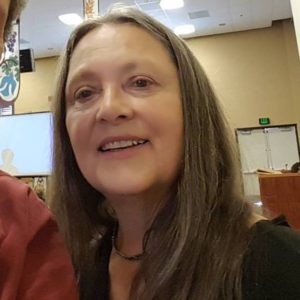 How They Do It: Kitty Cooper
How They Do It: Kitty Cooper
How long have you been doing genealogy?
I have been doing genealogy for 20 years and genetic genealogy for six years but I was always asking for family stories from my relatives from the time I was little.
What’s your favorite part of doing genealogy?
Solving puzzles and learning about the lives of my ancestors. Using DNA to solve mysteries, particularly unknown parentage cases. Blogging about it all. I am constantly surprised by how much I love blogging and how much effort I put into writing and rewriting my posts.
Do you consider your genealogy research well organized?
The electronic part is very well organized, paper less so. Everything is in well labeled folders but the problem is where those folders have wandered to. The scan pile? The current pile? The desk pile? Or the file cabinet drawer it should be in. After reading your blog I decided to reorganize my office in 2015. I am trying to get all the paper documents scanned in and uploaded to my various trees
What type of software do you use for organizing your genealogy research?
I have a folder for every client and for every ancestral line and for the lines within those lines so some of my folders are nested fairly deeply! All of these folders are in dropbox so I can move seamlessly from computer to computer to tablet to smartphone. As I regularly destroy laptops (coffee, water, dropping them, etc) this is very important. I no longer have a desktop computer.
I have Family Tree Maker 2017 but I mainly use it to export gedcoms of specific lines for cousins. I also have Rootsmagic which I like for its synching with familysearch. However my up-to-date tree is online at GENI.com and Wikitree.com (great for its DNA features) as well as somewhat at familysearch.org
I am a heavy user of spreadsheets (OpenCalc) for tracking all my matches, my correspondence, my clients, my time and many other things. I also have found that using a spreadsheet to do a McGuire diagram is really helpful for tough DNA cases or just drawing the picture. I take copies of documents from archives by taking photos with my smartphone. Next I use Adobe Photoshop Elements to improve and crop images as well as to make diagrams for my blogs. I use Google images to archive photos from my phone. I use WordPress for blogging and CMS Made Simple for my family history site. I use slides.com for my presentation slides. I would be lost without the ability to search my email, thank you Google for gmail.
For DNA work, I am a “pro” user of the tools at GEDmatch and DNAgedcom (Gworks). I keep a separate folder system for DNA data which is all in spreadsheets and text file logs. One for every relative I track. Plus my own online mapping tools to make pictures for family and my blog.
There are many other online tools and apps I use, if only I could remember which ones.
Do you keep a research log? If so, what format?
I keep a research log for each client, each family line, and each DNA tested relative. Plus a log of what to look up in the Norwegian farm books when I am next in Salt Lake City and what to look up in the NYC municipal archives when visiting there. These are just free form text files in Notepad and I note what I find in them as well. I often just take a tablet or smartphone to an archive which can easily update those logs since they are plain text files in dropbox.
Do you have a tree on Ancestry? If so, is it public or private? Why?
Yes I have a public imperfect tree so that ancestry’s cool DNA matching can match me to relatives who also have trees. With only one parent and one grandparent born in the USA (to immigrants), I do not have that many matches, or circles and no NADs.
What’s your biggest challenge when it comes to organizing your genealogy?
Finding the time to scan in the photos and documents from before I was mainly online. Dealing with the fact that my memory is not as good as it once was so I need to track everything in lists including paper and pencil for my daily to do list.
What’s your biggest piece of advice to beginning genealogists in terms of keeping track of their research?
CLUB: Cite, Log, Understand, Backup. In other words, keep good track of where each piece of information and record is from (cite) as well as what you found or did NOT find on a research trip (log), try to understand that dates and spellings often vary (as do Norwegian surnames), and always back up your work. Best to have off-site transparent backup whether dropbox or something similar. It is also good to contribute your work to one of the collaborative world trees for posterity.
What do you think is the most important thing for people to do to stay organized when it comes to family history research?
Use a system that works for them. Typically start with tools they use(d) in the work place, folders, spreadsheets, and word processors and then figure out what they need in addition. A genealogy program that fits their needs is a good thing to have as well.
If you were starting out new as a genealogist what would you do differently?
Note which relative told me what. I did not cite my sources well in the beginning. Scan and upload everything as soon as I got it. Filename should say what it is, for example LJMunsons1940census.jpg or HMLeeWWIdraftCard.jpg, with the person or family name first so that they are listed together in the folder.
Not be so trusting of the random trees online, especially at Ancestry.
Do you keep paper or electronic files (or both)?
Electronic only but I have extensive paper files from the 90s and archive forays before smartphones could take great pictures of documents and book pages. These are slowly getting scanned and added to my folders and online trees
Are you folder or binder person for your paper files?
Folders. Although I do have a binder from my first year of doing genealogy.
Do you use Evernote, One Note or any other electronic organizing system for your genealogy? If so, how do you use it?
No to Evernote. I use spreadsheets extensively via OpenCalc and Google Docs. Plus simple text files and FTM 2017.
Do you have a dedicated space in your home for doing genealogy research? What’s it like?
I have a home office for all my endeavors (I also have a web design business that I am slowly retiring from). It is a full sized room, formerly a bedroom, with a view of my fig tree, good natural light, good closet space, two file cabinets and two bookcases and a sweet dog keeping me company. Plus my wonderful husband has his own office in the next room over, so much better than when we shared an office, but still within shouting distance.
CLUB (Cite, Log, Understand, Backup) is a new acronym to me and I love it! I was fascinated to read all the tech tools that Kitty uses. I must also add Kitty’s disclaimer: “My brother, Shipley Munson, works for familysearch.org – he organizes the yearly RootsTech conferences and my son works for Google.” Those of us who attend RootsTech are very familiar with Shipley–it’s fun to learn that he and Kitty are siblings. What a genealogy-rich family!
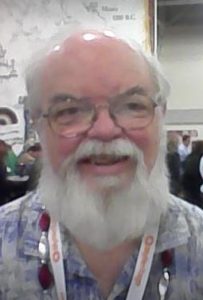
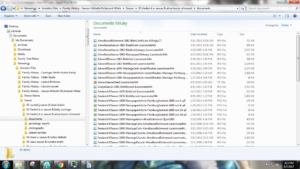
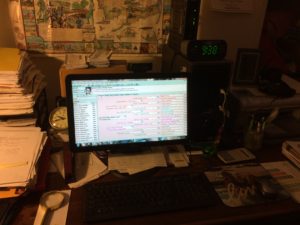
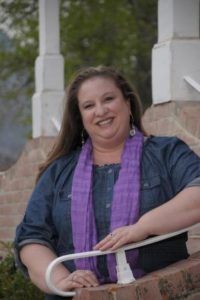 How They Do It: Crista Cowan
How They Do It: Crista Cowan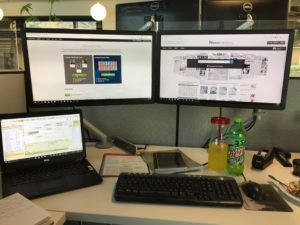 As the Corporate Genealogist for Ancestry, I’m lucky to get to do what I love every day as part of my job. So my work desk is my genealogy desk. I use a laptop as my primary computer and for years have had a large monitor attached to it so that I have double the screen space. Recently, however, I added a 2nd monitor so now I have three screens. I don’t know how I ever did without it. I can have Family Tree Maker open on one screen, Ancestry on another, and Newspapers.com on a third. It makes comparison and analysis of records so much easier. And, it ensures that my data entry is more accurate than if I had to flip back and forth between screens. I know this isn’t possible for everyone but even if you can just get a USB plug-in, portable monitor, it is totally worth it. That’s what I do at home – my laptop with a portable, plug-in monitor.
As the Corporate Genealogist for Ancestry, I’m lucky to get to do what I love every day as part of my job. So my work desk is my genealogy desk. I use a laptop as my primary computer and for years have had a large monitor attached to it so that I have double the screen space. Recently, however, I added a 2nd monitor so now I have three screens. I don’t know how I ever did without it. I can have Family Tree Maker open on one screen, Ancestry on another, and Newspapers.com on a third. It makes comparison and analysis of records so much easier. And, it ensures that my data entry is more accurate than if I had to flip back and forth between screens. I know this isn’t possible for everyone but even if you can just get a USB plug-in, portable monitor, it is totally worth it. That’s what I do at home – my laptop with a portable, plug-in monitor.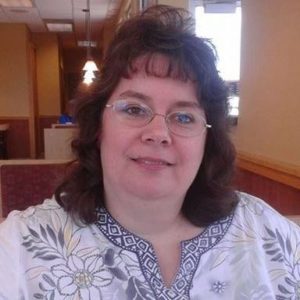 How They Do It: Melissa Barker, The Archive Lady
How They Do It: Melissa Barker, The Archive Lady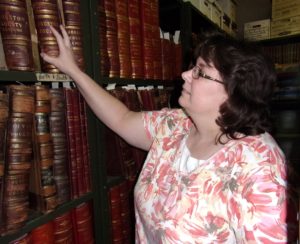 If I were a new genealogist just starting out, I would use archives much more. Archives have tons of records that are not online and are not even microfilmed. Archives are full of shelves of records just waiting for the genealogist to discover them. Archives have unique records that can help tell our ancestor’s story more completely.
If I were a new genealogist just starting out, I would use archives much more. Archives have tons of records that are not online and are not even microfilmed. Archives are full of shelves of records just waiting for the genealogist to discover them. Archives have unique records that can help tell our ancestor’s story more completely.